Have you ever thought about your adorable Munchkin cat’s health? They are known for their short legs and big hearts. It’s important to make sure they’re healthy. Even though Munchkin cats don’t often have many health problems, checking for signs they’re doing well is key.
Watching their weight and looking for changes in how they act or look is crucial. Knowing what to look for and keeping on top of their health will help you enjoy your cat for many years.
Key Takeaways:
- Munchkin cats are loved for their short legs but need extra care for their health.
- Issues like limb problems and not being able to move much can make them sick.
- Staying at a good weight helps Munchkins avoid other health issues.
- Pay attention to any new habits or changes in how they look to catch problems early.
- Regular vet visits and staying alert are important for a happy Munchkin life.
Introduction to Munchkin Cats: Unique Traits and Characteristics
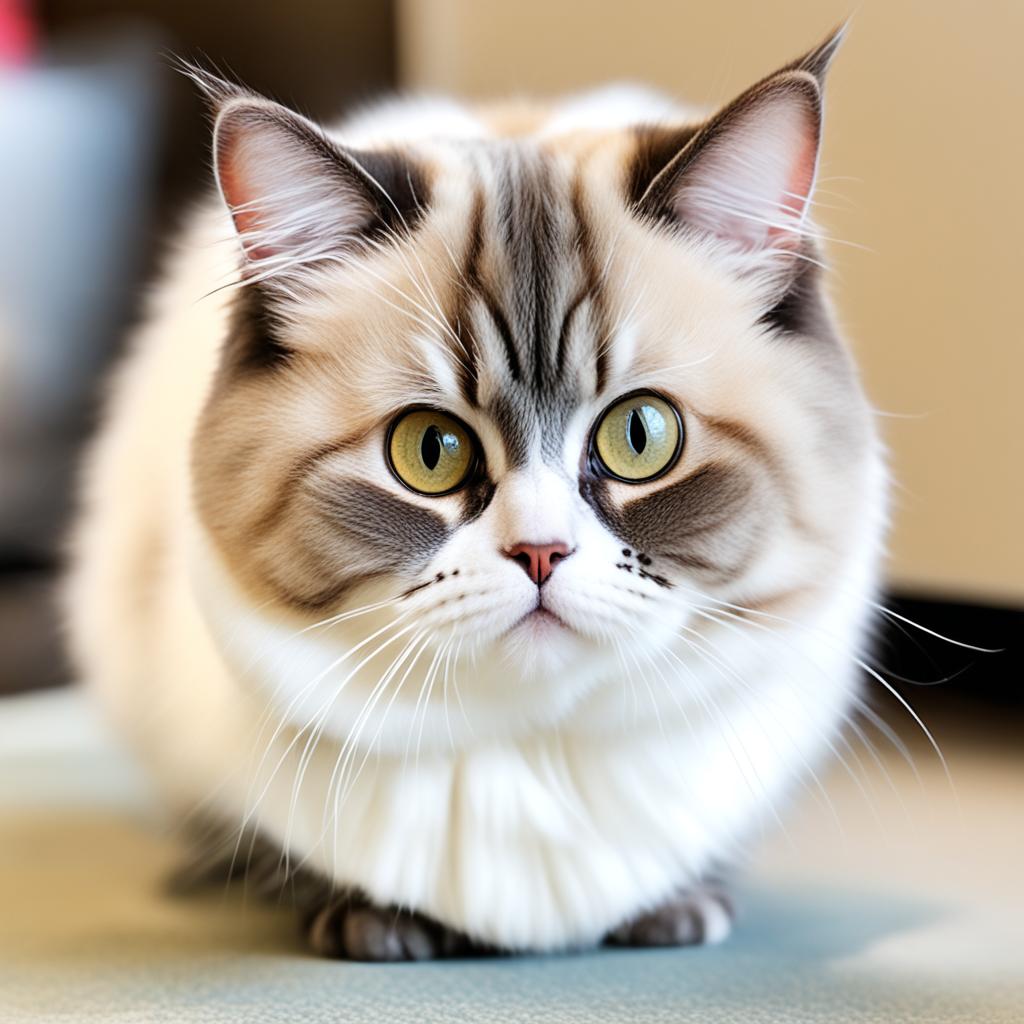
Meet the Munchkin cat, known for its short legs and big personality. Originating from Louisiana in 1991, these cats have quickly captured hearts around the world. They stand out with their unique looks and friendly nature.
Physical Appearance
The Munchkin cat’s look is quite unique due to their short legs. This comes from genetic mutations. These cats may be small, but they come in all kinds of colors and patterns. This makes every Munchkin cat special in its own way.
Behavioral Traits
Munchkin cats are not just cute; they’re also very friendly. They love to explore and play with their human friends. This makes them fun and great pets to have around.
Playfulness and Affection
Munchkin cats are known for their playful nature. They enjoy playing with toys and other pets. This makes them a great addition to any home, creating moments full of fun and love.
To summarize
| Characteristic | Details |
|---|---|
| Origin | Louisiana, 1991 |
| Appearance | Short legs, varied colors and patterns |
| Behavior | Curious, sociable, affectionate |
| Playfulness | Loves interactive games, perfect for families |
Understanding the Genetic Mutation: Dwarfism in Munchkin Cats
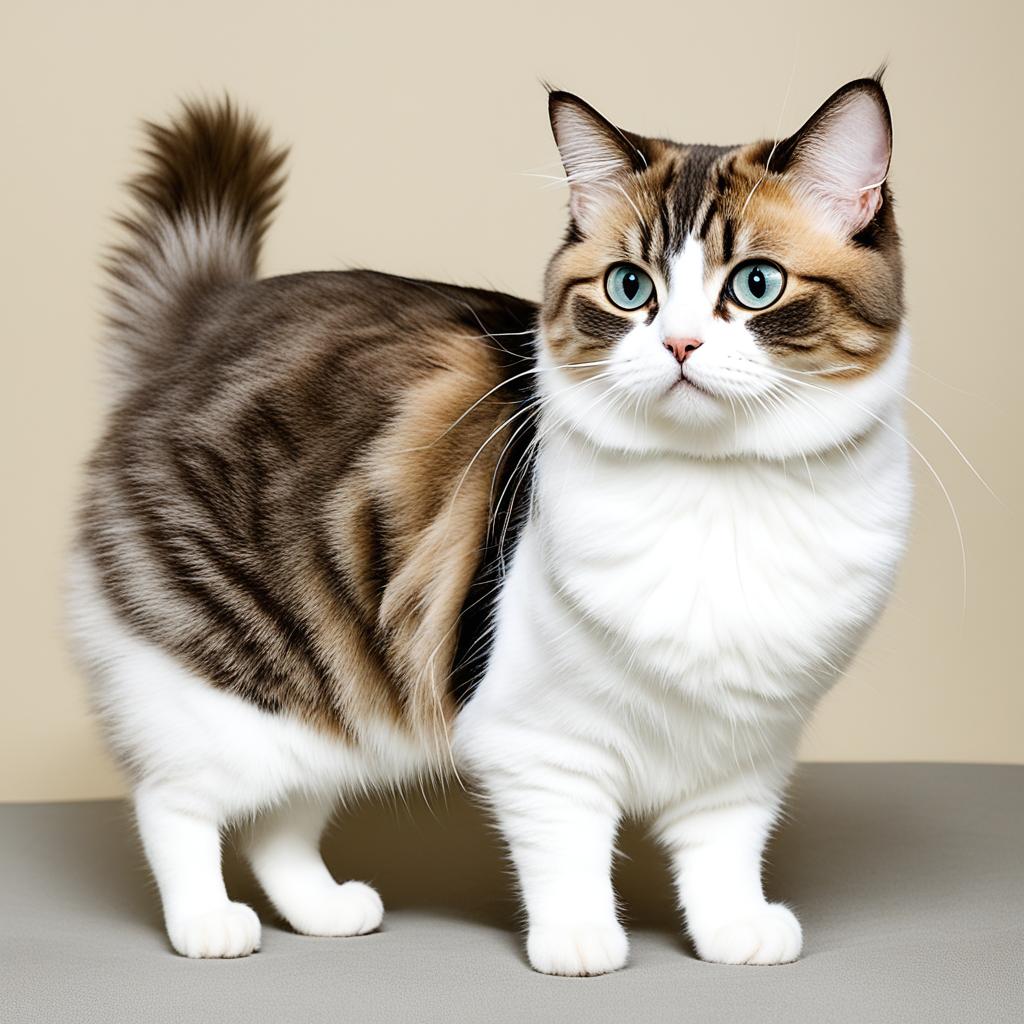
Munchkin cats are known for their cute, short legs. These come from specific genetic changes. But what do these mutations mean for their health?
Achondroplasia and Chondrodysplasia
The short legs of Munchkin cats result from achondroplasia and chondrodysplasia. These changes affect how their bones grow. It gives them their unique look but also unique care needs.
Impacts on Limb Development
This change in genes affects how their legs grow. They end up with sweet, little legs but might also face issues. These problems could affect their movement and how they live.
Health Concerns Related to Dwarfism
These genetic mutations can lead to health problems. Issues like osteoarthritis may happen. So, watching their health and visiting the vet often is important.
Keeping an eye on how they move can improve their life a lot.
Healthy Weight and Body Condition in Munchkin Cats

It’s important to keep Munchkin cats at a healthy weight. This helps them stay in good health. Keeping them from getting too heavy is key. Being overweight can cause serious health problems.
Feeding your Munchkin cat the right food is crucial. Choose cat food that’s high-quality and balanced. Don’t feed them too much. Stick to a feeding plan to avoid overeating.
Make sure your Munchkin gets enough exercise. Play with them often. This keeps them fit and burns off extra calories.
To check your cat’s weight, weigh them regularly. Use a schedule to stay on track. Look for any changes in their body and adjust their diet and exercise as needed.
| Body Condition Score | Description |
|---|---|
| 1 | Very thin – ribs visible, obvious waist, minimal fat covering |
| 3 | Ideal – ribs palpable but not visible, well-proportioned waist and abdominal tuck |
| 5 | Obese – ribs not palpable under heavy fat cover, no waist, abdominal rounding |
Regular playtime and feeding rituals help your Munchkin stay fit. This keeps them at a healthy weight. It also prevents diseases like heart problems. Your cat will live a better, longer life this way.
Remember these tips to keep your Munchkin healthy. They will thank you their whole life.
Coat and Skin Health: Indicators of Well-being
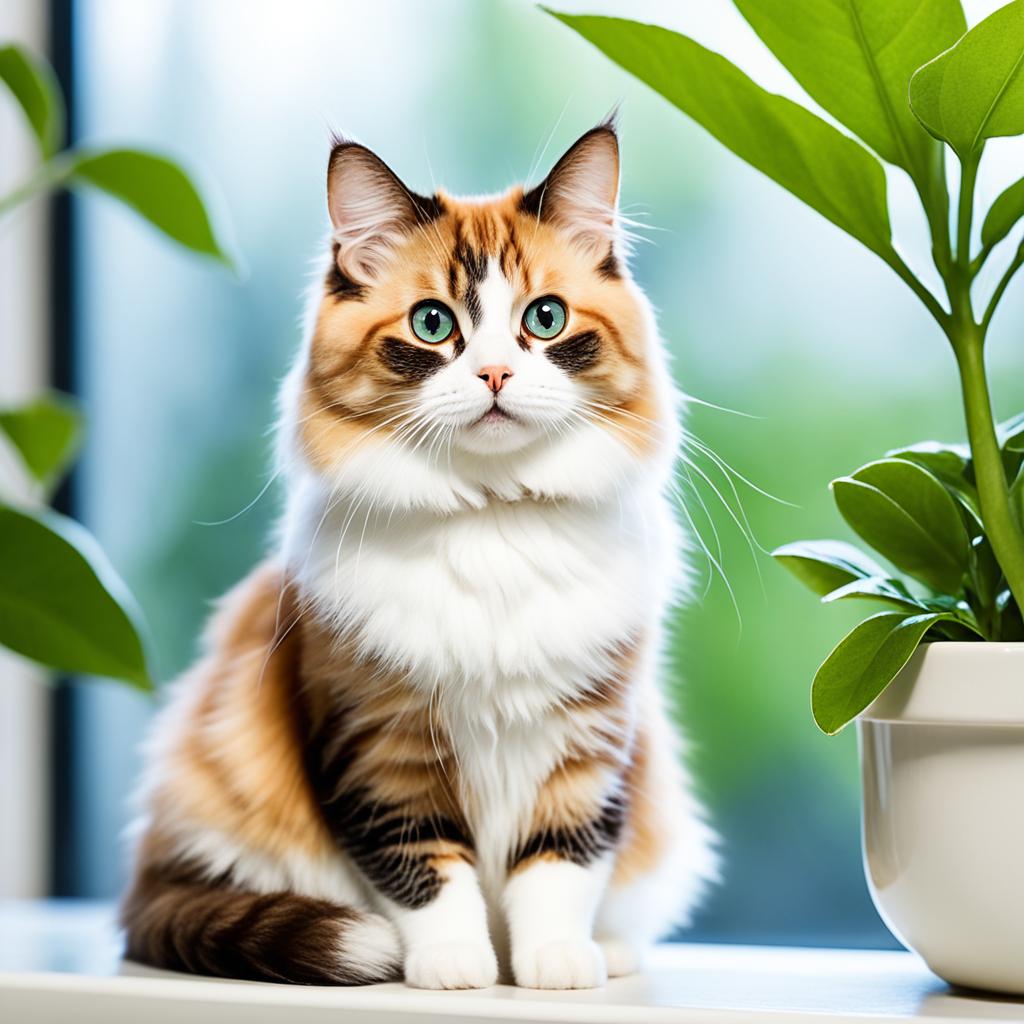
Making sure your Munchkin cat stays healthy often means watching its coat and skin. Your cat’s coat shows a lot about its overall health. It’s more than just a stylish look.
Shiny, Smooth Coat
A Munchkin cat’s coat should always look shiny and smooth. They show they’re in good health this way. Keep their coat looking beautiful with regular grooming. It also helps keep their skin healthy. If you see parts that look dull or feel rough, you need to look deeper into what’s wrong.
Absence of Parasitic Infections
Bugs like fleas and ticks can make your Munchkin cat’s skin painful and cause health issues. It’s key to regularly check for these pests. A cat free of such problems is a happy cat that won’t scratch itself all the time.
Grooming your Munchkin cat often and visiting the vet when needed helps keep them free from parasites. This is how you make sure your cat’s coat and skin are in top shape.
What Are the Signs of a Healthy Munchkin Cat?
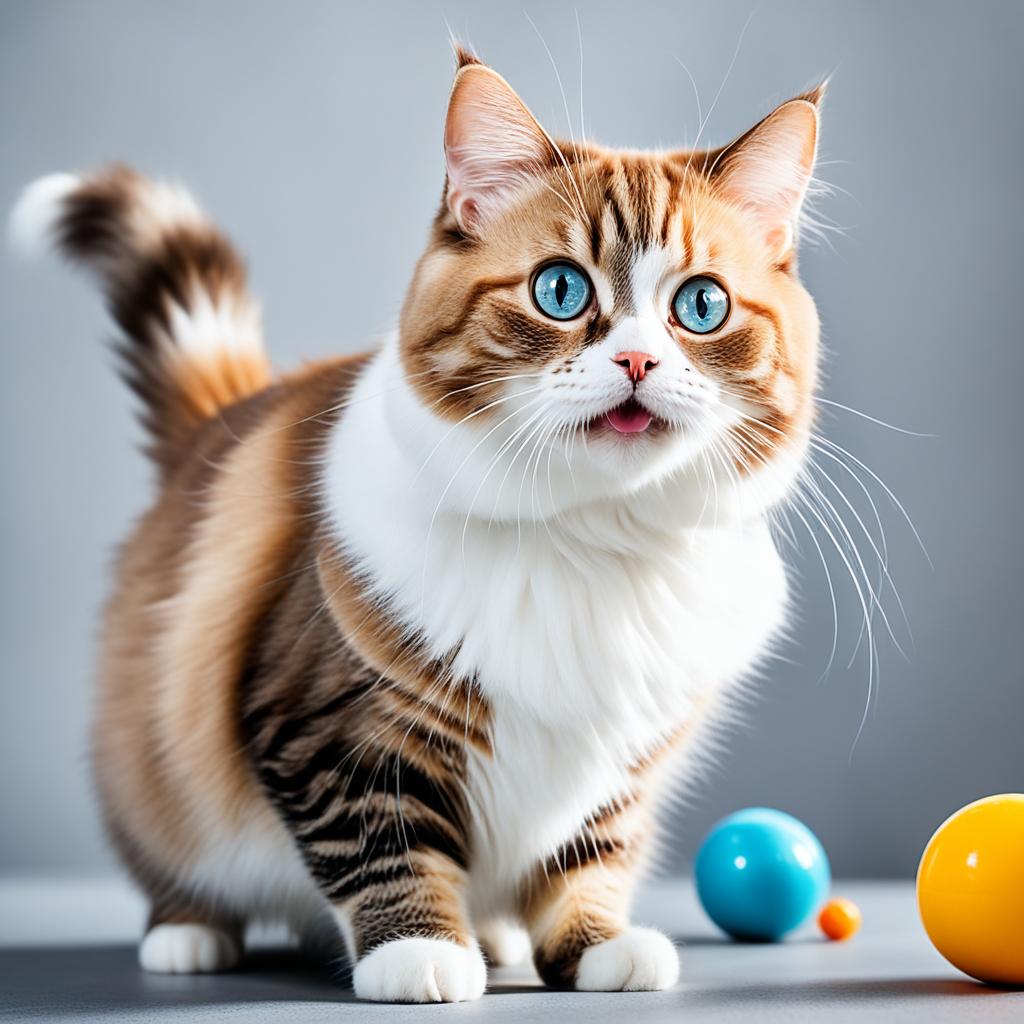
Knowing how to spot a healthy Munchkin cat is key to a long, happy life. Look for important health clues to make sure your cat’s in good health.
Bright, Clear Eyes
Their eyes are a big clue in understanding a Munchkin cat’s health. A healthy Munchkin cat will have shiny, clear eyes. They won’t show any signs of discharge, cloudiness, or redness.
Good Appetite and Healthy Digestion
A strong appetite is a sign of health in Munchkin cats. They should also have regular, healthy bowel movements. This means their stomach and digestion system are working well.
| Health Indicators | Signs of a Healthy Munchkin Cat |
|---|---|
| Eye Condition | Bright and Clear |
| Appetite | Good and Consistent |
| Digestion | Regular Bowel Movements |
Detecting Mobility Issues in Your Munchkin Cat

It’s vital to know how dwarfism affects mobility. Watch for signs like how your Munchkin moves and responds.
Observing Movement Patterns
Watch closely as your Munchkin walks, runs, and jumps. A limp, not wanting to move, or not jumping can be warning signs. These could mean there’s a mobility-related health issue.
Common Mobility-Related Health Problems
Mobility issues in Munchkin cats can lead to various problems. From limb deformities to osteoarthritis, these issues can cause pain and stiffness. Yet, regular, low-impact exercise can ease their discomfort and make life better for them.
| Health Problem | Signs to Watch For | Recommended Actions |
|---|---|---|
| Osteoarthritis | Stiff joints, reduced activity | Regular vet check-ups, joint supplements |
| Limb Deformities | Abnormal gait, difficulty jumping | Low-impact exercises, comfortable resting areas |
| Pain Management | Reluctance to move, vocalization when handled | Veterinary pain relief options, gentle handling |
Importance of Regular Veterinary Check-ups
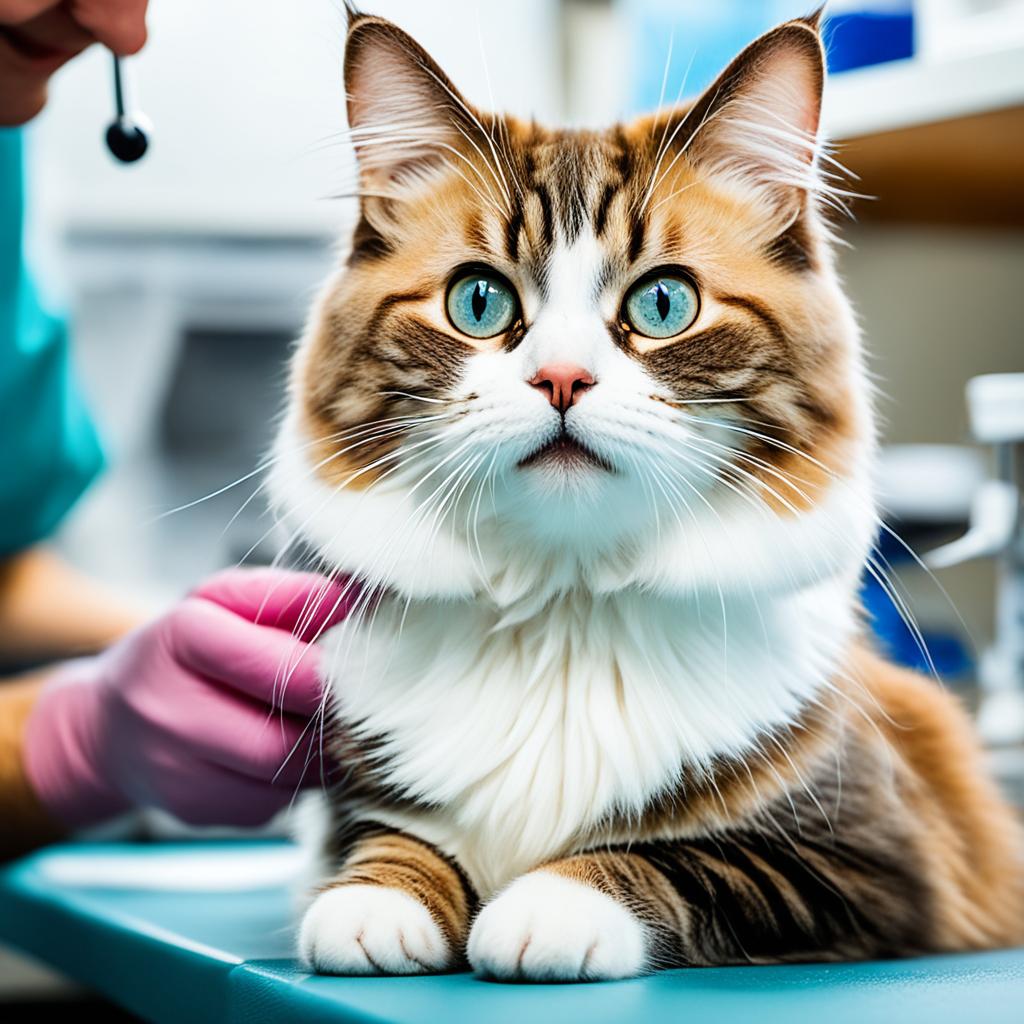
Scheduling regular visits to the vet is key to your Munchkin cat’s health. These appointments focus on three main aspects that help keep your cat healthy.
Routine Health Assessments
At these check-ups, early signs of health problems in your Munchkin are found. The vet checks your cat’s weight and condition, as well as their skin and coat. This early check helps start any needed treatment quickly.
Vaccinations and Parasite Control
Staying current on your cat’s vaccinations is a must. Vaccines protect against dangerous diseases. It’s also crucial to keep parasites like fleas, ticks, and worms away with regular treatments.
| Health Aspect | Importance | Recommended Action |
|---|---|---|
| Munchkin cat health assessments | Early disease detection | Annual vet visits |
| Vaccinations for Munchkin cats | Prevents common infections | Follow vet schedule |
| Parasite control in cats | Eliminates pests | Regular flea, tick, and worm treatments |
Following these steps will keep your Munchkin cat happy and healthy. They will be ready to bring joy and fun every day.
Dental Health: Key to Longevity and Comfort

Maintaining your Munchkin cat’s dental health is crucial for a long and happy life. Just like humans, they need their teeth to be healthy. Looking after their dental health in Munchkin cats is a key part of their care.
Teeth might not be the first thing you think of, but they’re vital for Munchkin cats. Regular brushing helps prevent many health issues. Don’t forget about professional cleanings too. They catch problems early, saving your cat from pain.
So, what do you need to do for your Munchkin’s teeth?
- Brush their teeth every day with toothpaste made for cats.
- Give them dental treats and toys to chew on.
- Get their teeth cleaned by a vet every year.
- Have regular dental check-ups for your cat.
These steps are key for your cat’s dental health. They help keep your Munchkin comfortable and happy. Watch for signs of health in Munchkin cats, like clean teeth and pink gums. This can show early problems. Your furry friend will be grateful.
| Dental Care Task | Frequency |
|---|---|
| Brushing | Daily |
| Dental Treats | Weekly |
| Professional Cleaning | Annually |
| Dental Exams | Every 6 months |
If you follow these steps, your Munchkin’s teeth will be in top shape. This is vital for their well-being. Remember, keeping a close eye on their teeth and routine checks help them stay healthy and happy. Your Munchkin cat will keep smiling with your care!
Monitoring Hydration and Nutritional Needs
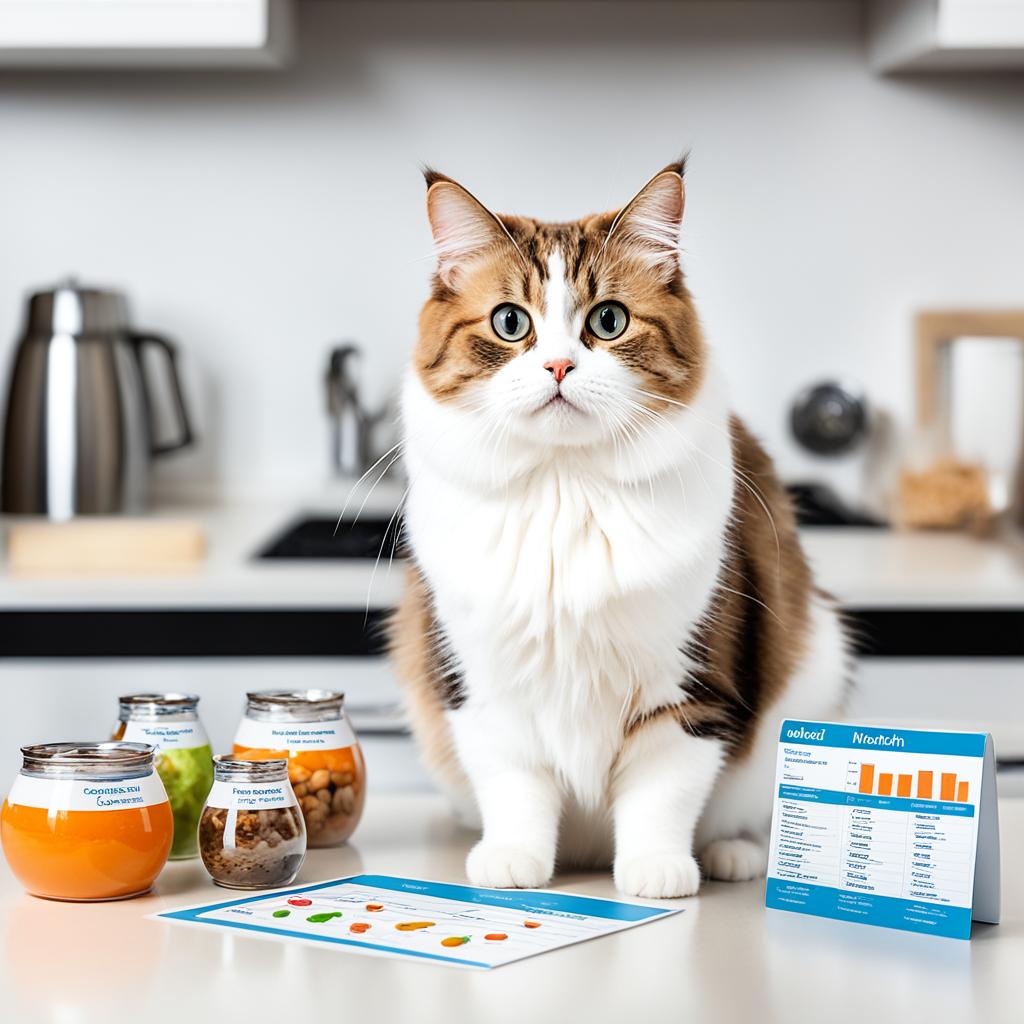
Ensuring your Munchkin cat is well-hydrated and eats right is very important. Munchkin cats are prone to issues like urinary problems. These can be lessened by making sure they drink enough water. Also, a diet that meets their nutritional needs is key for their health.
Water Intake
Hydration is key for Munchkin cats because of their risk of urinary problems. Make sure they always have fresh water. Some might prefer drinking from moving sources. So, think about getting a pet water fountain to keep them interested in drinking.
Balanced Diet
Munchkin cats need a diet that’s well-balanced and full of important nutrients. They should get plenty of high-quality protein, fats, vitamins, and minerals. A diet made just for their age, size, and energy level helps keep their immune system strong and their fur looking great.
Signs of Dehydration
It’s crucial to spot dehydration signs early. Watch for signs like dry gums, being less active, and eyes that look sunk in. If you see these signs, it’s vital to talk to your vet right away. Keeping an eye out for these signs will help your Munchkin stay healthy and hydrated.
| Aspect | Recommendation |
|---|---|
| Water Intake | Provide fresh water daily, consider a water fountain |
| Balanced Diet | Select high-quality cat food with necessary nutrients |
| Dehydration Signs | Check for dry gums, lethargy, and sunken eyes |
Common Health Issues and Preventive Measures
Your Munchkin cat’s health is vital. Knowing about common health issues is crucial. By focusing on prevention, you can help your cat live a healthier life.
Spinal Problems
Spinal issues are significant for Munchkin cats. Their unique skeleton can cause spinal problems. You should check on your cat’s movement regularly.
Early signs of spinal problems are important to catch. Talk to your vet about exercises and supplements. These can help lower the risks.
Osteoarthritis
With their short legs, Munchkins may face osteoarthritis. This can cause joint pain and less movement as they grow older.
Encourage low-impact exercises. Also, feed them food with Omega-3. This can help with osteoarthritis.
Keeping a healthy weight is important. It lowers the pressure on their joints.
Hyperthyroidism
Hyperthyroidism is a common problem for cats, not just Munchkins. It affects their metabolism, causing weight loss and a big appetite.
Getting regular thyroid checks is important. This can help catch the issue early. Special diets and meds are how you treat hyperthyroidism.
Be on top of your cat’s health with regular check-ups. Managing these issues early will let your Munchkin cat live a full life. Just remember, it’s always best to prevent problems if you can.
FAQ
What are the key health traits of a Munchkin cat?
A Munchkin cat looks healthy with a shiny, smooth coat and bright eyes. They should eat well and easily pass stool. Controlling their weight and noticing behavior changes are key.
How can I identify the unique physical appearance of Munchkin cats?
Munchkin cats are known by their short legs that are a product of genetic changes. They have long bodies and come in many coat colors. Their unique look often makes them stand out.
What behavioral traits should I expect in a Munchkin cat?
Munchkin cats are curious, friendly, and like to play. They enjoy being with people and other pets. A home with activities is perfect for them.
Can you explain dwarfism in Munchkin cats?
Genetic mutations cause dwarfism in Munchkin cats, leading to their short legs. This can sometimes cause health problems like poor limb growth.
Health issues for dwarf Munchkin cats include limb problems and trouble moving. These can be painful, requiring special care and sometimes treatment.
How can I maintain a healthy weight in my Munchkin cat?
Keeping Munchkin cats at a healthy weight needs good food, not too much, and exercise. This helps avoid joint and heart problems. Make sure to check their weight often.
What indicators suggest good coat and skin health in Munchkin cats?
A healthy Munchkin cat will have a shiny coat and clear skin. Keep them free of parasites and well-groomed. If you see signs of poor skin or coat, get help right away.
What signs should I look for to determine if my Munchkin cat is healthy?
An active appetite and clear eyes often show a Munchkin cat is healthy. Their digestion and bowel habits also tell a lot about their health. Watching these things can help catch health problems early.
How can I detect mobility issues in my Munchkin cat?
Watch how your Munchkin moves and responds. Look out for signs of arthritis or unusual legs due to dwarfism. Simple, regular exercise can help with these problems.
Why are regular veterinary check-ups important for Munchkin cats?
Regular vet visits keep Munchkins healthy with up-to-date shots and by checking for diseases. This early care can make sure they live a long, healthy life.
How critical is dental health for Munchkin cats?
Dental health is vital to a Munchkin cat’s well-being. It can prevent pain and illness. Regular dental care is important.
How can I ensure my Munchkin cat stays hydrated and nourished?
Offer plenty of fresh water to keep your Munchkin healthy. A balanced diet is also essential. Watch for signs of not drinking enough, and see a vet if worried.
What are common health issues in Munchkin cats and preventive measures?
Spinal issues, arthritis, and an overactive thyroid are common in Munchkin cats. A special diet, regular check-ups, and proper medicine help prevent these problems.




